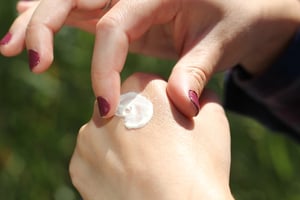As we age, the reproduction and repair of cells slow. As a result, we often experience slower...
How To Prevent and Treat Easy Bruising in Older Adults
One of the most common symptoms of aging is experiencing easy bruising. Unlike younger individuals, older adults may find that their skin bruises with even minor bumps or knocks, causing unsightly marks and potential discomfort.
Easy bruising can occur due to a variety of reasons, including medication side effects, underlying medical conditions, and vitamin deficiencies. While easy bruising may not always be a cause for concern, it is essential to take preventative measures to avoid unnecessary injury and potential complications. Moreover, prompt treatment of bruises can prevent the development of more severe complications, such as infections or blood clots.
In this article, we will delve into the causes of easy bruising in older adults and explore effective strategies to prevent and treat bruises. Continue reading to help ensure that your skin remains healthy and resilient, allowing you to live an active and comfortable life, free from the discomfort and unsightly marks of frequent bruising.
What Is Bruising?
Bruising occurs when capillaries under the skin break due to trauma. When this happens, bleeding occurs in the tissue, causing skin discoloration. The discoloration is caused by blood clots that form to prevent further bleeding. However, there are times when clotting isn't sufficient to curb bleeding. As a result, the bruise becomes severe or forms more easily.
Why do older adults bruise easily?
With age, skin gets more fragile. This is because the skin cells' multiplication, differentiation, and growth rates are slower. As a result, the skin thins and becomes susceptible to bruising. Besides aging, genetics and long-term exposure to the sun also play a part in its fragility.
Further, the skin of older adults often has decreased moisture retention capabilities, causing it to lose elasticity. The ability of older adults' skin to self-replenish also diminishes, and wounds take more time to heal. Finally, with time, the body loses the fatty layer beneath the skin that cushions blood vessels against impact.
With that said, let's look at how to prevent and treat bruising in seniors:
How to Prevent Bruising
-
Wear Additional Layers
Bruising often occurs due to direct contact between the skin and a hard object that breaks the capillaries. However, by wearing additional layers for protection, you can minimize the damage of the impact. For instance, wearing thick or protective clothing comes in handy in protecting against trauma or physical impact. When possible, wear long sleeves and thick layers to add cushion between the skin and hard surfaces you might bump.
-
Live Without Clutter
Another potential cause for bruising in older adults is a cluttered environment. Living in a congested environment with furniture and objects all over the floor is a recipe for accidents. One can bump the furniture while walking and get bruises. Or even worse, clutter can cause trips and falls.
Therefore, you should clear up clutter and organize living spaces to prevent accidents that could cause bruises (or worse). For starters, you can open the area by removing non-essential pieces of furniture. Next, you can hide electric cables lying around on the floor. Finally, collect and store away any objects or items on the floor.
-
Check Your Lighting
Good lighting is necessary to reduce the risk of injury in the home. During the day, you can utilize the daylight to brighten up the entire house, from living rooms to walkways. At night, consider installing night lights that will help you when visiting the bathroom. Further, you can install bright lights in the entire house to prevent you from bumping into objects in the shadows. As a bonus, always have a flashlight nearby in case the power goes off, or it is too dark to find the light switch.
-
Consume Vitamin C and Iron
 Vitamin C combined with iron helps the body be less susceptible to bruises. This is because vitamin C helps harden capillaries, while iron helps replenish blood cells.
Vitamin C combined with iron helps the body be less susceptible to bruises. This is because vitamin C helps harden capillaries, while iron helps replenish blood cells.While consuming these nutrients through your diet food is important, you can also rely on supplements to get enough quantity. Further, you can also seek advice from your doctor on the proper amount of these nutrients to consume daily.
Besides hardening the capillaries, vitamin C helps strengthen your immune system by boosting the function of white blood cells. Also, it acts as a powerful antioxidant helping the body eliminate harmful free radicals. Lastly, vitamin C plays a part in forming connective tissues, which are crucial for healthy blood vessels, joints, and skin.
-
Ask About Your Prescriptions
It's important to consult your healthcare provider on possible medications that could encourage skin thinning and easy bruising. With their help, you can replace the harmful prescription. With that said, don't abandon any medications without your doctor's advice.
Treating Bruises
If you already have bruises, consider the following tips to help minimize the pain and length of time your bruises stick around!
-
Moisturize
 Dry skin also promotes bruises among older adults. With the loss of elasticity, any strain on the skin leads to easier bruising. Thankfully, you can rely on moisturizing lotion to improve your skin moisture content and prevent further damage. Also, you can consider other topical treatment like creams that helps in minimizing inflammation and pain. Remember to drink plenty of water too!
Dry skin also promotes bruises among older adults. With the loss of elasticity, any strain on the skin leads to easier bruising. Thankfully, you can rely on moisturizing lotion to improve your skin moisture content and prevent further damage. Also, you can consider other topical treatment like creams that helps in minimizing inflammation and pain. Remember to drink plenty of water too! -
Use a Cold Compress
When your skin develops swelling accompanied by pain due to bruising, a cold compress is one of the best treatments. That said, take care when implementing this treatment to avoid causing further damage. For starters, always use a thin barrier between your bare skin and the cold item. And when you're cold-compressing, do it continuously for about 20 minutes and then take a break.
Bruising in older adults is more common due to thinner skin. With less protection of the capillaries, any impact can potentially rupture them causing bleeding in the skin. As mentioned earlier, the effect will be skin discoloration as the system attempts to stop bleeding through blood clots.
While bruises are often mild and harmless, it's important to note that they can become severe. So, if you're getting bruised too often, consider the above tips as well as your doctor's advice.







